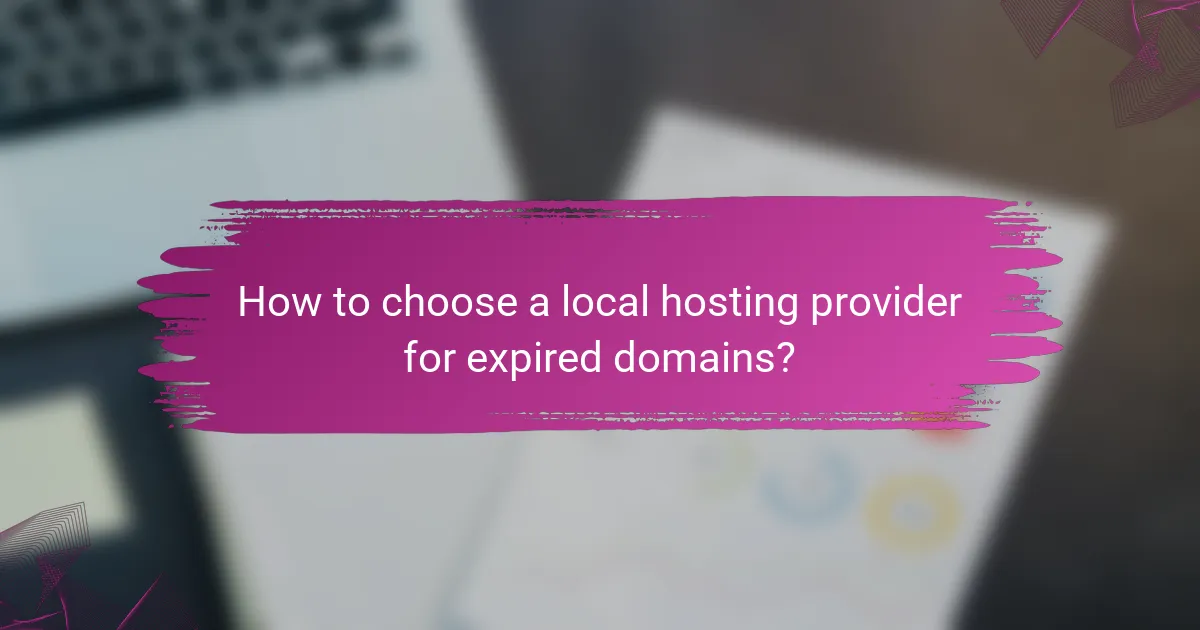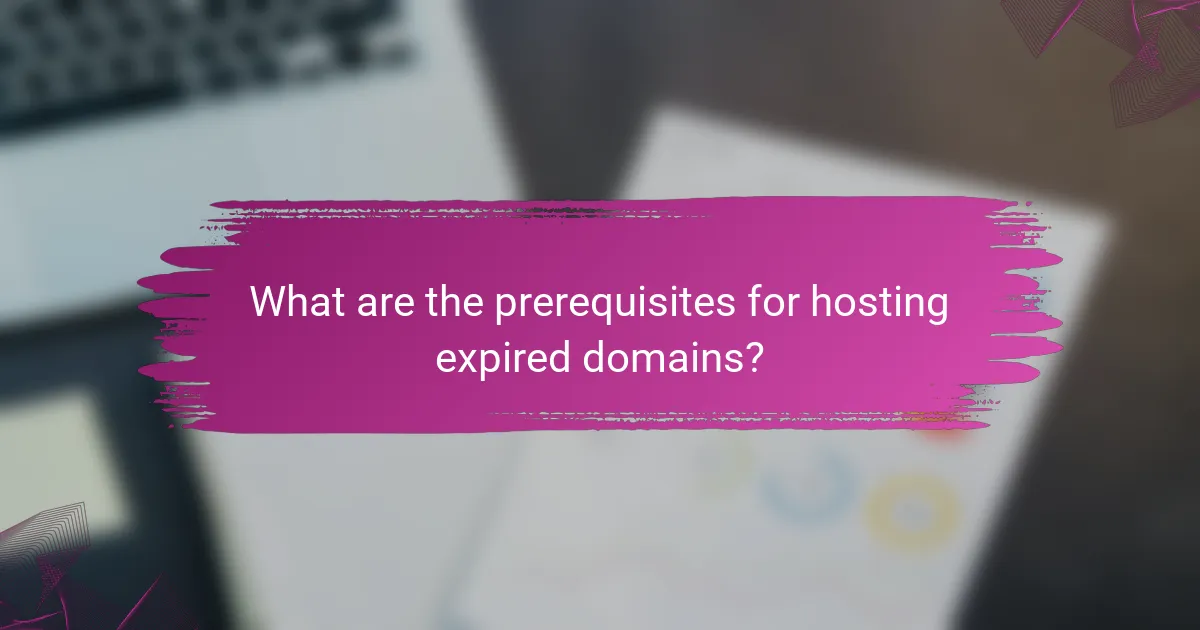When it comes to expired domain names in South Africa, selecting a local hosting provider can greatly enhance your site’s performance and SEO potential. Local hosting options offer advantages such as faster access speeds, improved customer support, and tailored features for effective domain management. By carefully evaluating factors like server performance and pricing, you can maximize the value of your expired domain and improve user experience.

What are the best local hosting options for expired domain names in South Africa?
For expired domain names in South Africa, several local hosting options stand out due to their reliability, customer support, and features tailored for domain management. Choosing the right host can significantly impact your site’s performance and SEO potential.
Bluehost
Bluehost is a popular choice for hosting expired domain names, especially for beginners. They offer a user-friendly interface and a free domain name for the first year, making it easy to get started.
With plans starting around R50 to R100 per month, Bluehost provides solid uptime and 24/7 customer support. Their integration with WordPress is particularly beneficial for users looking to build a blog or website quickly.
HostGator
HostGator is known for its flexible hosting plans and robust performance. They provide a variety of options, including shared, VPS, and dedicated hosting, which can accommodate different needs for expired domains.
Pricing typically ranges from R40 to R120 per month, and their 99.9% uptime guarantee ensures that your site remains accessible. HostGator also offers a 45-day money-back guarantee, allowing you to test their services risk-free.
SiteGround
SiteGround is recognized for its exceptional customer support and high-speed performance. They focus on security and offer daily backups, which is crucial for maintaining expired domains.
Plans start at approximately R70 per month, and their managed WordPress hosting is particularly appealing for users who want to optimize their sites for search engines. SiteGround’s data centers in South Africa ensure fast loading times for local visitors.
A2 Hosting
A2 Hosting is known for its speed and reliability, making it a great option for hosting expired domains. They offer a unique Turbo option that can increase page load speeds significantly.
Pricing starts around R50 per month, and their commitment to performance is backed by a 99.9% uptime guarantee. A2 Hosting also provides free site migration, which is helpful if you’re transferring an expired domain from another host.
InMotion Hosting
InMotion Hosting is a solid choice for businesses looking to host expired domain names. They provide a range of plans with features like free SSL and unlimited bandwidth, which are essential for growing websites.
Plans generally start at about R40 per month, and their customer support is highly rated. InMotion also offers a 90-day money-back guarantee, giving you ample time to evaluate their services without risk.

How to choose a local hosting provider for expired domains?
Choosing a local hosting provider for expired domains involves evaluating several key factors, including server performance, customer support, and pricing structures. These elements will help ensure that your expired domain is hosted efficiently and effectively, maximizing its potential value.
Evaluate server performance
Server performance is crucial for the reliability and speed of your website. Look for providers that offer high uptime percentages, ideally above 99.9%, and fast loading times, typically under 200 milliseconds. You can check reviews and performance benchmarks to gauge how well a provider’s servers perform under load.
Consider the type of hosting offered, such as shared, VPS, or dedicated servers. Each type has different performance characteristics, with dedicated servers generally providing the best speed and reliability but at a higher cost. Assess your needs based on expected traffic and resource requirements.
Check customer support availability
Reliable customer support is essential, especially if you encounter issues with your hosting. Look for providers that offer 24/7 support through multiple channels, such as live chat, phone, and email. Quick response times can significantly reduce downtime and frustration.
Read customer reviews to understand the quality of support provided. A hosting provider with a reputation for excellent customer service can make a significant difference in your experience, particularly when managing an expired domain that may need immediate attention.
Assess pricing structures
Pricing structures can vary widely among hosting providers, so it’s important to compare costs and what is included in each plan. Look for transparent pricing with no hidden fees, and consider whether the provider offers a money-back guarantee or trial period.
Evaluate the long-term costs, including renewal rates, which can often be higher than initial promotional prices. Aim for a balance between affordability and the features you need, ensuring that you get good value for your investment in hosting your expired domain.

What are the benefits of local hosting for expired domain names?
Local hosting for expired domain names offers several advantages, including faster access speeds, improved search engine optimization (SEO) rankings, and more responsive customer support. By hosting locally, businesses can enhance user experience and maintain better control over their online presence.
Improved website speed
Local hosting significantly boosts website speed by reducing latency. When servers are located closer to the target audience, data travels shorter distances, resulting in faster load times. This is crucial as users expect websites to load within a few seconds; delays can lead to higher bounce rates.
For example, a website hosted in South Africa for a South African audience can achieve load times in the low tens of milliseconds, compared to international hosting, which may result in delays of several hundred milliseconds. Prioritising local hosting can enhance overall performance and user satisfaction.
Better SEO rankings
Search engines favour websites that load quickly and provide a good user experience, making local hosting beneficial for SEO. When an expired domain is hosted locally, it can improve site speed, which is a key ranking factor. Additionally, local hosting can enhance relevance for geographically targeted searches.
For instance, a business targeting customers in Johannesburg will benefit from hosting its expired domain on a server located in or near Johannesburg, as this can help improve visibility in local search results. Ensuring your website is optimised for local SEO can lead to higher organic traffic and better conversion rates.
Enhanced customer support
Local hosting often comes with better customer support options. Providers based in South Africa can offer timely assistance during business hours, which is crucial for resolving issues quickly. This can be particularly important for businesses that rely on their websites for sales or customer engagement.
Choosing a local hosting provider means you can communicate in the same time zone and language, reducing misunderstandings and improving service quality. Look for providers that offer 24/7 support to ensure you have help available whenever you need it.

What are the potential risks of using local hosting?
Using local hosting for expired domain names in South Africa can pose several risks, including limited scalability, higher costs, and data privacy concerns. These factors can impact the overall effectiveness and sustainability of your hosting solution.
Limited scalability
Local hosting often struggles with scalability, meaning it may not efficiently handle increased traffic or resource demands. As your website grows, you might find that your local server cannot accommodate the necessary bandwidth or storage, leading to slow performance or downtime.
To mitigate this, consider your growth projections before committing to local hosting. If you anticipate significant traffic increases, explore options that allow for easy upgrades or transitions to more robust hosting solutions.
Higher costs
Local hosting can incur higher costs compared to cloud-based alternatives. Expenses may include purchasing hardware, software licenses, and ongoing maintenance. Additionally, if you require technical support, hiring local IT professionals can further increase your expenses.
Evaluate your budget carefully. If your needs are modest, local hosting might be feasible, but for larger operations, consider cloud hosting solutions that offer pay-as-you-go pricing models to control costs more effectively.
Data privacy concerns
Data privacy is a significant risk with local hosting, especially if sensitive information is involved. Local servers may not comply with regulations like the POPIA, which can lead to legal issues if data breaches occur.
To protect your data, ensure that your local hosting solution implements robust security measures, such as encryption and regular backups. Additionally, stay informed about relevant privacy laws to ensure compliance and avoid potential fines.

What are the prerequisites for hosting expired domains?
To host expired domains, you need to ensure you have ownership of the domain and a suitable hosting provider. Additionally, understanding the domain’s previous traffic and SEO value can help you make informed decisions about its future use.
Ownership of the Domain
Before you can host an expired domain, you must acquire ownership through a registrar. This often involves purchasing the domain from a previous owner or through an auction. Ensure that the domain’s registration is active and that you have access to the domain management settings.
Choosing a Hosting Provider
Selecting the right hosting provider is crucial for managing your expired domain effectively. Look for providers that offer features like easy domain management, good uptime, and customer support. Popular options in South Africa include Bluehost, SiteGround, and GoDaddy, which cater to various needs and budgets.
Assessing Previous Traffic and SEO Value
Understanding the expired domain’s previous traffic and SEO value can significantly impact your hosting strategy. Use tools like Ahrefs or SEMrush to analyse the domain’s backlink profile and traffic history. A domain with a strong SEO foundation may offer better opportunities for monetisation or traffic generation.
Technical Setup Considerations
Once you own the domain and have a hosting provider, you need to configure DNS settings to point to your hosting server. This typically involves updating the nameservers in your domain registrar’s control panel. Be prepared for propagation times, which can range from a few minutes to 48 hours.
